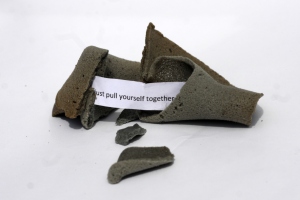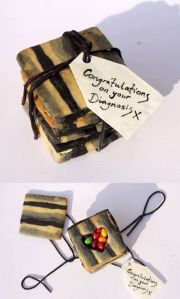This is absolutely Brilliant!!!!!
You have to read this and particularly go to the link to see the images:
http://eatocracy.cnn.com/2013/08/14/emotional-eating-gray-cakes-tackle-depression-taboo/
Depression is a daily struggle for millions of people, and stigma around the illness only adds to the burden. Emma Thomas’ Depressed Cake Shop campaign is helping make conversations around the taboo topic a piece of cake.
“The concept is: make gray cakes, sell gray cakes and create a platform for discussion and media coverage,” said Thomas. “And I think that’s what we’ve done.”
The London-based PR specialist and creative director became increasingly aware that people in the creative community around her frequently suffer from depression, but don’t always have the freedom to discuss this with people in their professional or personal lives.
“If you go to the doctor and you’re depressed the doctor will sign you off with stress so depression isn’t on your record,” Thomas said. “If you return to work after having the flu, people don’t judge you forever. But if you have depression and you return to work after being down, you’re judged forever.” Frustrated with the taboo, and the further toll it was taking on people she cared about, Thomas began cooking up a scheme. Her agency, Cakehead Loves, runs a yearly, cake-centric initiative to benefit specific causes. In 2011, the sweet treats were sushi-shaped, with sales going to benefit tsunami victims. In 2012, after the death of Steve Jobs, tech-themed cakes raised money for pancreatic cancer charities.
In early August, Thomas and the Eat Your Heart Out baking collaborative launched a pop-up Depressed Cake Shop in London’s Brick Lane – selling only gray baked goods to visually represent mental illness – with proceeds going to support mental health services. Now at least 50 offshoots are springing up across the U.K., Malaysia, Argentina, Pakistan and the United States.
Thomas credits the appeal of the movement to its simple, fun approach to a sticky subject. “There are always heavy leaflets and websites and there isn’t an easy way for people to offer their support or create discussion,” she said.
With the Depressed Cake Shop, “People can engage on a light level. It doesn’t have to be heavy, and they don’t have to go jogging. It enables people to support charity by just buying cake.”
With so many volunteer-driven pop-up shops around the globe, Thomas and her team can’t personally oversee each location, but instead offer creative guidance. “We’ll do the PR and create awareness,” she said. “We’ll get everything ready for you. It gives confidence in the concept.”
Participants must agree to abide by two rules: sell only gray baked goods (“Otherwise it’s not a news story!”), and give the proceeds to a mental health charity.
And conversation about the cause isn’t just happening over sad-faced cookies and cloud-printed macarons. Thomas said that the Facebook group for volunteers has fostered a safe environment for sufferers of depression, and their loved ones, to talk about a painful subject.
“Loads have people said that it makes it accessible,” said Thomas. “Where people wouldn’t go to a lecture on depression, the group is nice because it’s a really relaxed environment that everyone feels comfortable in.”
Sabrinah Morad is one of those volunteers, organizing a two-day pop-up shop in Malaysia and finding kindred spirits in the online community. Morad was brought into the Depressed Cake Shop fold by her sister, Zainah, who owns a Malaysian style cafe in Cardiff, Wales and participated in the project there.
“My stepfather has depression and as long as I can remember, his illness was spoken in hushed tones,” said Morad. “We never truly understood it as we were growing up and almost felt as if we were to blame in a way because he was sad all the time.”
She and her sister were never allowed to talk about what was going on at home, and found that people in her culture associated her father’s symptoms with the occult, black magic or a hex.
“I remember just a few years ago when some of my stepfather’s relatives from the village came to my mother’s house with a Bomoh (medicine man) to bless the house and chase the ‘demons’ from him,” Morad said.
Morad firmly believes that being able to speak about depression in a casual way would help the public understand that it’s not just something that can easily be shaken off, and that they should be unashamed.
“We lack support groups here, there are very few trained counselors here,” she said. “Hopefully with awareness comes support and better medical care for this illness.”
Jane Reyes helped organize the pop-up effort in San Francisco. Together with QueerLife Space, her group raised $1000 in one day to support mental health services – a cause that hits very close to home. The trained jeweler gradually lost muscle function in her extremities due to a degenerative disease called Charcot-Marie-Tooth, but found she still had enough mobility to bake and decorate cakes.
“I had this thing that was forgiving and understanding of my limitations, permanent or temporary and I was good at it so it provided me with much pride and sense of accomplishment,” Reyes wrote in an e-mail. “To someone disabled with mental or physical disease these things are rare and precious.”
The solidarity within the Depressed Cake Shop volunteer community has proven essential to Reyes in her battle with the depression brought on by her painful disability.
“Making these connections through cake that are saving my life,” she wrote. “When I heard of Emma’s project, it struck me like lightning and I knew I must be a part of it.”
Thomas is well aware of the deep impact her initiative has made, and acknowledges that the biggest struggle right now is to encourage participants to keep it simple.
“Everyone is wanting to complicate it,” she said. “‘Let’s set up support groups. Let’s do this…’ That’s not what we’re about. It’s make gray cakes, sell gray cakes – that’s it.”
Thomas is seeking for someone to look after the Depressed Cake Shop’s legacy and make sure it carries on into the future.
“We’re having people baking and telling us their stories, and people baking because of how it’s affected their friends. It’s amazing and moving,” she said. “And it was only ever meant to be one shop!”
The next 50 – and no doubt countless more – are just the cherry on top of a truly sweet idea.
Depressed Cake Shops in the United States will be popping up in Los Angeles, New York City, Atlanta and more cities to come. Want to get involved? There’s more information at depressedcakeshop.com.

